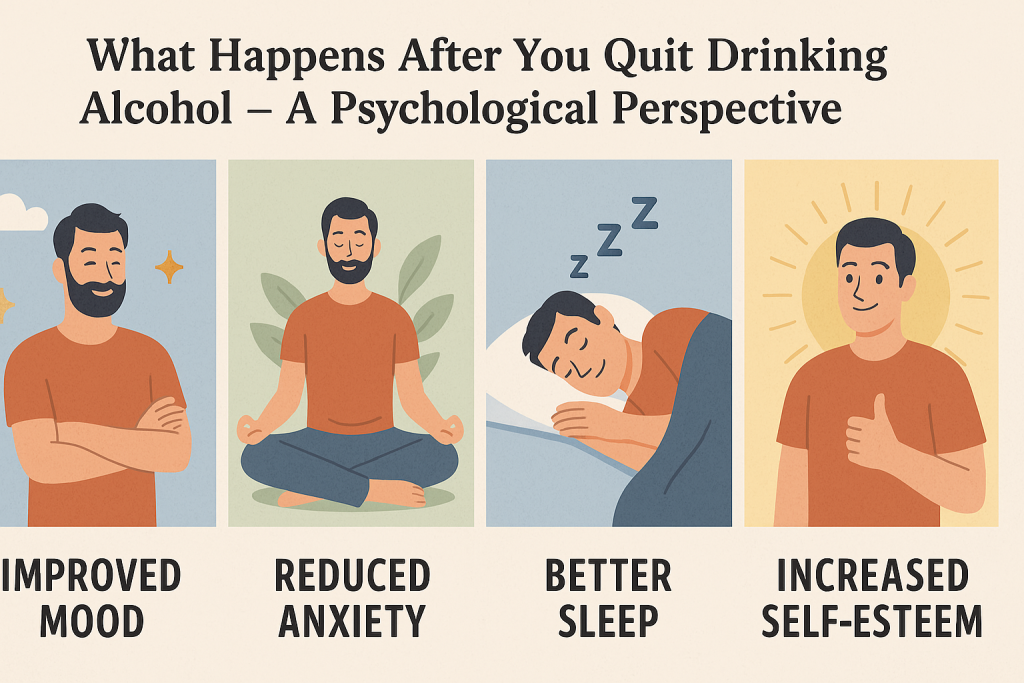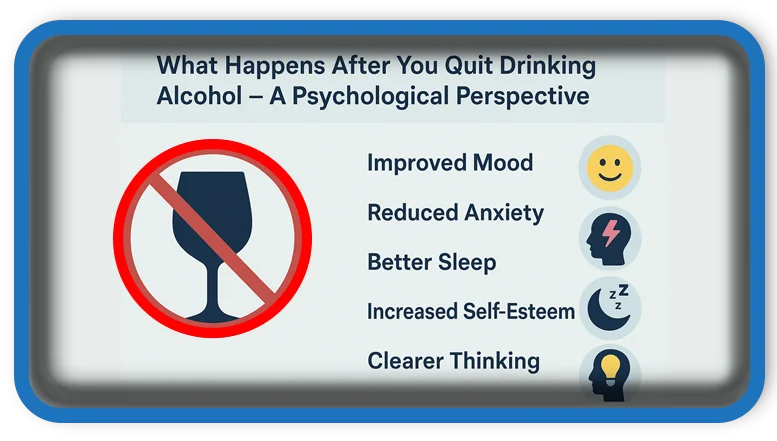⏲️ Estimated reading time: 5 min
What Happens After You Quit Drinking Alcohol – A Psychological Perspective. Quitting alcohol transforms more than just your physical health it reshapes your mind, your emotions, and your self-identity. Here’s a deep psychological look at what truly happens after you decide to stop drinking.
The Psychological Journey Begins with a Decision
Deciding to quit drinking alcohol is often portrayed as a physical challenge, but it’s actually a profound psychological shift. When you make that choice, you are not just removing a substance from your body you’re challenging long-standing habits, beliefs, and coping mechanisms. This decision can trigger a complex mix of emotions: hope, fear, doubt, excitement, and sometimes even grief.
That’s because alcohol often serves as more than just a drink. It becomes a part of your routine, your social life, and your identity. The first psychological impact of quitting is the realization of how deeply entwined alcohol is with how you live and how you see yourself.
The First Days: Withdrawal and Emotional Whirlwinds
In the initial days and weeks after quitting, your body begins to detox, but your mind goes into overdrive. Without alcohol as a buffer, you start feeling everything more intensely anxiety, stress, irritability, even boredom.
These feelings are part of psychological withdrawal. Your brain’s chemistry is adjusting. Alcohol numbs emotions by increasing the effect of a neurotransmitter called GABA (which calms the brain) and decreasing glutamate (which excites the brain). Once you stop drinking, this balance is disrupted. The brain now has to relearn how to regulate emotions naturally.
This can feel overwhelming, but it’s also a sign that your nervous system is healing and regaining balance.
Facing the Mirror: Self-Reflection and Identity Crisis
One of the most powerful psychological effects of quitting alcohol is the confrontation with yourself. Many people start to question:
- Who am I without alcohol?
- What do I enjoy when I’m sober?
- How do I cope with stress, sadness, or boredom now?
This self-reflection can be liberating or scary or both. It’s common to experience a sort of identity crisis. But this stage is also rich with opportunity. You begin to rediscover your real interests, passions, and values many of which were hidden under the haze of drinking.
Emotional Growth and Increased Resilience
Over time, your emotional landscape starts to stabilize. You begin to feel emotions more clearly and respond to them more maturely. What used to trigger you into drinking like conflict, sadness, or even celebration now becomes a chance to grow emotionally.
This is one of the most beautiful psychological benefits of sobriety. Develop coping mechanisms that don’t rely on escape. You become more resilient. You learn how to sit with discomfort, process it, and come out stronger on the other side.

The Return of Clarity, Confidence, and Creativity
With regular alcohol consumption, your brain operates in a kind of fog. Many people report poor concentration, memory issues, and a general sense of dullness. Once that fog lifts, a new world opens up.
Your thoughts become clearer. You start making better decisions. You become more reliable, both to yourself and others. Self-confidence grows because you’re no longer controlled by cravings or hangovers you’re in charge now.
Creativity often returns as well. Many sober individuals discover a renewed passion for art, music, writing, or entrepreneurship. These are expressions of a mind that is finally free to think deeply, feel honestly, and create without limitations.
Relationships and Social Dynamics Shift
One of the biggest psychological adjustments comes in your relationships. If you drank with friends or used alcohol to connect socially, things may feel awkward at first. Some relationships might fade. Others might deepen.
You may discover who truly supports you and who was only present for the party. This process, while painful, leads to more authentic connections. You start attracting people who appreciate the real, sober version of you not the altered one.
Setting boundaries, learning to say no, and becoming more honest in relationships are all signs of emotional maturity. Sobriety gives you the clarity to make these changes.
Inner Peace, Purpose, and Meaning
After the storm of early recovery passes, many people report an emerging sense of peace. Life becomes more stable. You wake up with more energy and fewer regrets. Your self-esteem grows. You begin to trust yourself again.
This opens the door to deeper questions:
- What is my purpose?
- What do I want to create in my life?
- How can I help others?
Quitting alcohol often leads people on a path of meaning. Whether through spirituality, service, or personal growth, many discover that sobriety is not just about abstinence it’s about awakening.
Final Thoughts
Quitting alcohol isn’t just a physical detox it’s a psychological transformation. You break old patterns, confront your fears, and uncover who you really are beneath the bottle. It’s not always easy, but it’s worth it.
Every day you stay sober, your brain heals, your emotions stabilize, and your soul strengthens. You’re not just surviving without alcohol you’re thriving with purpose, clarity, and peace.
🏷️ Tags: alcohol recovery, mental health, sobriety journey, quit drinking, emotional healing, self discovery, personal growth, sober living, psychological health, life after alcohol
Only logged-in users can submit reports.
Discover more from HelpZone
Subscribe to get the latest posts sent to your email.

